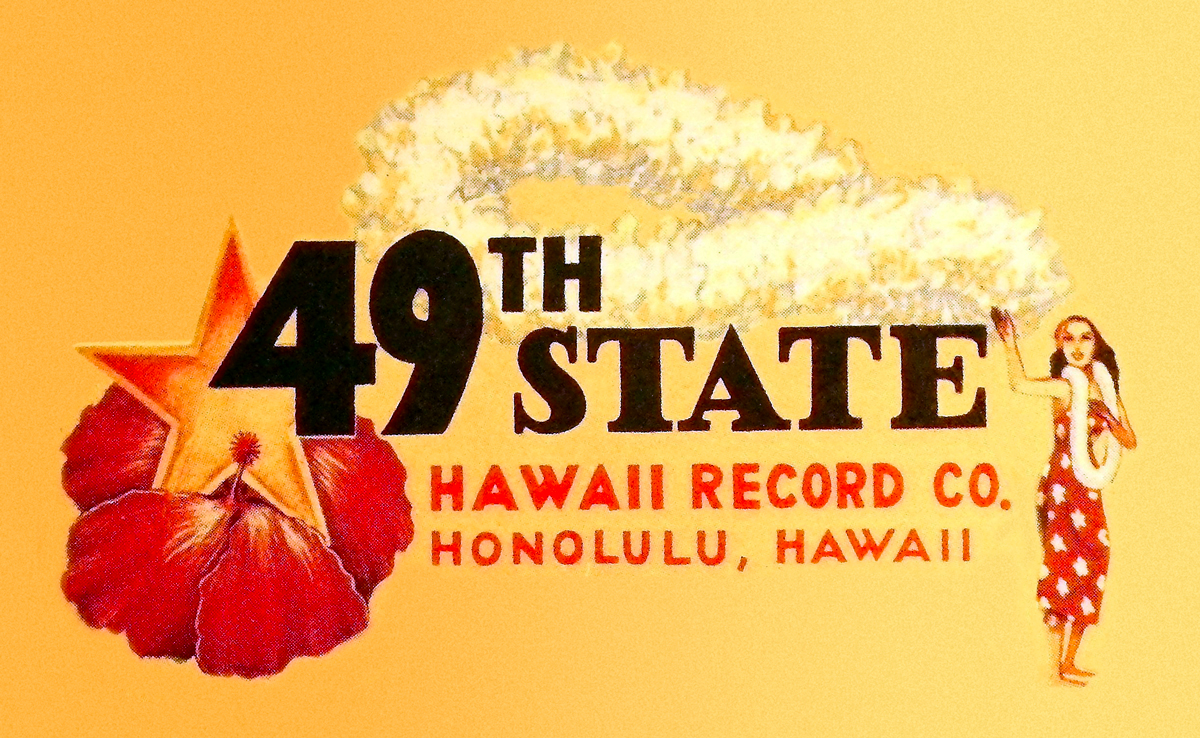49TH STATE HAWAII RECORD COMPANY
| At the end of WWII 49th State Hawaii Record Company was founded by Honolulu, Hawaii record store owner George K. Ching. It was so named because many businessmen were anticipating Hawaii's eventual attainment of statehood, however no one realized then that Alaska would actually gain that distinction, and Hawaii would end up as the 50th. |
Ching's Maestro Music Store in downtown Honolulu got lots of foot traffic from Allied Nations Forces servicemen stationed in or passing through Hawaii. They wanted to take home with them an authentic musical souvenir that captured the essence of their Hawaiian experience and the music of the day. Also straight after WWII the local population suddenly had plenty of money to spend on non-essentials such as music but there was not much in the way of Hawaiian music recordings available to sell.
|
To meet the demand the 49th State Hawaii Record Company was born. To guarantee authenticity in the recording performances, Ching enlisted Hawaiian composer and musician John Kameaaloha Almeida known as the Dean of Hawaiian Music as the label's musical director. At the time Almeida was teaching ukulele and guitar lessons at Maestro. Almeida had a few 78rpm recordings made of his own musical compositions but had difficulty finding financing and distribution for them so the creation of the label was also the perfect solution for Almeida's prolific composing and desire to record. |
Almeida set about discovering, recruiting, and mentoring a troupe of local talent to record on the new label, many who went on to great success including a young Genoa Keawe who made her first ever recording in 1946; legendary slack key guitarist and singer Gabby Pahinui; steel guitar master Benny Rogers; Kumu hula master, falsetto vocalist, composer, and choreographer John Pi'ilani Watkins; master falsetto vocalist Joe Keawe, and celebrated Kumu hula, Hawaiian chanter, Hawaiian culture preservationist , and originator of the Merrie Monarch hula festival George Na'ope, just to name a few. |
The first 49th State recordings were made using an acetate record cutting machine, in a make-shift studio at Ching's own home using a portable disc-cutter. They were first released on 78rpm records. When the technology became available, a tape recorder was used recording first on paper tapes and then later on plastic. In later years they were released on 45 rpm and 33 1/3 rpm. Many of these songs, became mainstays of the Hawaiian music repertoire.
|
"49th State was a special company - all Hawaiian artists - authentic. One-hundred plus steps up to his [Ching's] house in Manoa Valley - way up on a hill. So many memories - so much nostalgia." Genoa Keawe remembered fondly.
Along the way, Ching found that beyond authentic Hawaiian music there was a demand for the music from the rest of Polynesia and also for Japanese music of Hawaii performed by the Nisei generation. Much of the Japanese music of Hawaii is performed in a big-band-style-orchestra with Japanese language vocals. Those recording also became part of the 49th State Hawaii Record Company's catalog of recordings.
|
Fast forward...
In the 1980s Michael and Maryann Cord noticed that many of the important old-time Hawaiian record labels had gone out of business and their releases were long out of print. In 1991, the Cord's began buying up outright or leasing the rights to those old recordings and digitally restoring them for re-issue. 49th State Hawaii Records is among the Hawaii record labels the Cord's brought back to life. |
"One of our first acquisitions was the '49th State Hawaii Records' label," Michael Cord later recalled. "Our dream was to re-release the music completely restored and remastered. The recordings were originally released on big, thick, scratchy 78-rpm discs that were played on a Victrola. There was lots of noise -hisses and pops- and we wanted the listening experience to be just like when it was when these recordings were brand new - only better." |
The 78-rpms, 45-rpms, and 33 1/3-rpm LPs were vanishing along with the history. The Cord's wanted to know: Who were these artist? What was their story? What was their history? What was the history of the songs? The Cord's wanted to bring a precious time capsule buried long ago back to life. The name of their record company is Hana Ola. Hana Ola translates from the Hawaiian language as work of life or to grant life.
With a team of amazing partners and producers - all leading experts in the fields of Hawaiian music, dance, language, history, and storytelling including the walking-talking-living-breathing encyclopedia of all things Hawaiian music Harry B. Soria, Jr.- and with the magic of the digital age and extensive computer audio restoration the Cord's managed to do just that with the 49th State Hawaii Record Company catalog. The music and the stories have been lovingly preserved for an ever expanding family of loyal music fans and educators from across the globe.
|
|
|

